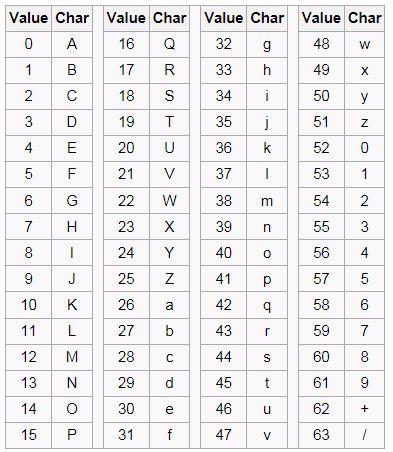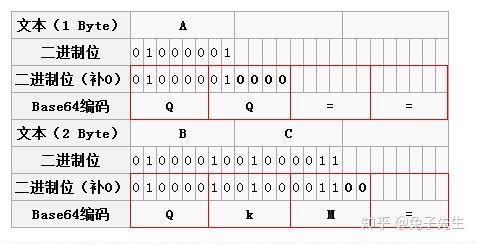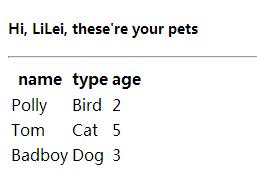
一、邮件协议
在谈谈代码之前,先来了解下邮件的基本协议。

电子邮件协议是基于TCP层定义的,主要有下面几个:
- SMTP协议
SMTP 是 Simple Mail Transfer Protocol 的简称,即简单邮件传输协议,是发送协议。
它定义了一组从源地址到目的地址传输邮件的规范,并支持在传送过程中通过不同网络主机实现中转及传送。
- POP3协议
POP3是 Post Office Protocol 3 的简称,属于接收协议,POP3是即POP(邮局协议)的第3个版本,也是因特网电子邮件的第一个离线协议。
它规定了终端如何接入远程的邮件服务器并下载电子邮件。
- IMAP协议
IMAP的全称是 Internet Mail Access Protocol,即交互式邮件访问协议,是一种支持同步接收的协议。
该协议由斯坦福大学在1986年研发,目前是最流行的邮件收取功能协议。
开启IMAP功能之后,电子邮件客户端可同步接收服务端的邮件,无论在客户端还是服务端上的操作都会反馈到另一方,比如删除、标记等;
此外IMAP还支持只对选中的部分邮件进行收取,这在POP协议上是做不到的。
关于数据传输
大多人都知道,电子邮件的传输采用了Base64编码对邮件内容进行包装,这是一种基于64个可打印字符来表示二进制数据的方法。

如上是Base64编码的字符映射表,64个字符可对应6个bit位。
一个字节是8个bit位,那么3个字节刚好需要4个Base64的字符来表示,而3个字节(4个字符)也是Base64编码的最小单位,
在编码过程中对于不足的部分采用"="号来补齐,如下:

另外一个需要知道的协议是MIME(Multipurpose Internet Mail Extensions),即多用途互联网邮件扩展
在前面介绍SpringBoot-MiMe类型处理的文章中提到过,这是一种用来定义文档性质及格式的标准。
一段内容,是文本、图片、音频,还是二进制,都通过MIME类型来进行声明和解析。
常见的MIME
| 内容 | 后缀 | MIME |
|---|---|---|
| 普通文本 | .txt | text/plain |
| RTF文本 | .rtf | application/rtf |
| PDF文档 | application/pdf | |
| Word文件 | .word | application/msword |
| PNG图像 | .png | image/png |
| GIF图形 | .gif | image/gif |
| JPEG图形 | .jpg | image/jpeg |
二、SpringBoot 与邮件
SpringBoot 是一个脚手架,邮件功能其实是通过 JavaMail来实现的。
JavaMail是Java实现邮件收发功能的标准组件,其提供了一组简便的API来实现邮件处理,同时也支持各类认证协议。
这里不对JavaMail 做展开介绍,由于有了SpringBoot,实现一个邮件发送功能变得非常简单。
下面将展示几个例子,包括:
- 使用springboot 发送文本邮件;
- 如何发送带附件的邮件;
- 如何使用 thymeleaf 发送模板邮件,支持html格式。
A. 添加依赖
spring-boot-starter-mail是一个封装了邮件功能的组件,依赖如下:
<dependency>
<groupId>org.springframework.boot</groupId>
<artifactId>spring-boot-starter-mail</artifactId>
<version>${spring-boot.version}</version>
</dependency>
B. 配置文件
按下面的配置设置SMTP服务器、用户密码、及收发人信息
//smtp 服务器
spring.mail.host=smtp.qq.com
//smtp 端口
spring.mail.port=25
//发送用户名
spring.mail.username=xxx
//发送密码
spring.mail.password=xxx
//收发人
spring.mail.from=xxx@qq.com
spring.mail.to=xxx@qq.com
//启用鉴权
spring.mail.properties.mail.smtp.auth=true
//不使用tls
spring.mail.properties.mail.smtp.starttls.enable=false
spring.mail.properties.mail.smtp.starttls.required=false
C. 发送文本邮件
编写下面的代码,实现简单的文本发送:
@Service
public class SimpleMailSender implements CommandLineRunner {
private static final Logger logger = LoggerFactory.getLogger(SimpleMailSender.class);
@Autowired
private JavaMailSender mailSender;
@Autowired
private Environment environment;
private void sendText() {
String from = environment.getProperty("spring.mail.from");
String to = environment.getProperty("spring.mail.to");
SimpleMailMessage msg = new SimpleMailMessage();
msg.setFrom(from);
msg.setTo(to);
msg.setSubject("first email from yourself");
msg.setText("hello world!");
this.mailSender.send(msg);
logger.info("send text done");
}
@Override
public void run(String... args) throws Exception {
sendText();
}
JavaMailSender、SimpleMailMessage 都是对JavaMail接口的封装,目的仅在于提供更简易的使用方式。
SimpleMailSender 继承了CommandLineRunner ,在SpringBoot启动时会触发sendText方法,
此时尝试启动SpringBoot应用,可以看到日志输出:
o.h.s.m.SimpleMailSender : send text done
此时检查收件箱,便可以看到对应的文本邮件。
D.发送附件
基于前面发送文本的例子,实现附件发送的代码如下:
private void sendAttachment() throws MessagingException {
String from = environment.getProperty("spring.mail.from");
String to = environment.getProperty("spring.mail.to");
// 使用Mime消息体
MimeMessage message = mailSender.createMimeMessage();
// multipart参数为true,表示需要发送附件
MimeMessageHelper helper = new MimeMessageHelper(message, true);
helper.setFrom(from);
helper.setTo(to);
helper.setSubject("first file from yourself");
helper.setText("check the file");
//指定系统文件
File file = new File("D:\\\\temp\\\\attachment.xlsx");
FileSystemResource resource = new FileSystemResource(file);
helper.addAttachment(file.getName(), resource);
mailSender.send(message);
logger.info("send attachment done");
}
同样,启动应用并发送邮件后,在收件邮件中获得了附件:

E. 发送Html邮件
许多邮件都包含了丰富的文本样式,这是通过HTML邮件实现的。
对于此类场景的通用做法是使用模板来发送,应用程序只关注模型数据的传参即可。
SpringBoot 可利用 thymeleaf 页面引擎来实现HTML的模板,首先需要引入thymeleaf
<dependency>
<groupId>org.springframework.boot</groupId>
<artifactId>spring-boot-starter-thymeleaf</artifactId>
<version>${spring-boot.version}</version>
</dependency>
接着新建一个模板,
/src/main/resources/templates/mail/template.html
<html>
<body>
<h4 th:text="|Hi, ${customer}, these\'re your pets|"></h4>
<hr></hr>
<table>
<tr>
<th>name</th>
<th>type</th>
<th>age</th>
</tr>
<tr th:each="p : ${pets}">
<td th:text="${p.name}"></td>
<td th:text="${p.type}"></td>
<td th:text="${p.age}"></td>
</tr>
</table>
</body>
</html>
上面的模板中是一个宠物列表的页面(表格),宠物模型定义:
public static class Pet {
private String name;
private String type;
private int age;
public Pet(String name, String type, int age) {
super();
this.name = name;
this.type = type;
this.age = age;
}
...
我们在发送邮件时,需要注入宠物列表数据,
代码如下:
@Service
public class SimpleMailSender {
/**
* 日志工具
*/
private static final Logger logger = LoggerFactory.getLogger(MailService.class);
@Autowired
private JavaMailSender mailSender;
@Autowired
private TemplateEngine templateEngine;
@Autowired
private Environment environment;
private void sendTemplateMail() throws MessagingException {
String from = environment.getProperty("spring.mail.from");
String to = environment.getProperty("spring.mail.to");
// 使用Mime消息体
MimeMessage message = mailSender.createMimeMessage();
MimeMessageHelper helper = new MimeMessageHelper(message, true);
helper.setFrom(from);
helper.setTo(to);
helper.setSubject("first html report from yourself");
// 根据模板、变量生成内容
// 数据模型
List<Pet> pets = new ArrayList<Pet>();
pets.add(new Pet("Polly", "Bird", 2));
pets.add(new Pet("Tom", "Cat", 5));
pets.add(new Pet("Badboy", "Dog", 3));
Context context = new Context();
context.setVariable("customer", "LiLei");
context.setVariable("pets", pets);
String text = templateEngine.process("mail/template", context);
helper.setText(text, true);
mailSender.send(message);
}
}
启动应用,发送邮件后的效果:

三、CID与图片
使用 thymeleaf 可以快速的制作出一个Html模板,
有时候我们需要在邮件中显示一张图片,怎么办呢?
-
使用img标签,并指定一个在线的图片;
此方案比较通用,应该说大多数在线平台都采用这种做法,但这么做的前提是需要有一个统一的图片存储及访问系统。 -
使用 Base64编码,在页面中嵌入编码后的内容:
<img width="100" height="100" src="data:image/jpg;base64,/9dxxFEF8fEkqAAgAAAAL===" />
该方案非通用,在实测中发现Outlook 无法展示这类标签,客户端并未支持。
下面列举了支持内嵌图片展示的一些邮件客户端:

- 采用CID 方案,图片作为内嵌资源
CID就是ContentID,是一种在MIME消息体中用于定义并引用内容块的机制。
RFC2392 对这个进行了定义。
一个带CID的消息体如下所示:
--boundary-example 1
Content-Type: Text/HTML; charset=US-ASCII
to the other body part, for example through a statement such as:
<IMG SRC="cid:foo4*foo1@bar.net" ALT="IETF logo">
--boundary-example-1
Content-ID: <foo4*foo1@bar.net>
Content-Type: IMAGE/GIF
Content-Transfer-Encoding: BASE64
R0lGODlhGAGgAPEAAP/////ZRaCgoAAAACH+PUNvcHlyaWdodCAoQykgMTk5
NSBJRVRGLiBVbmF1dGhvcml6ZWQgZHVwbGljYXRpb24gcHJvaGliaXRlZC4A
etc...
那么,使用CID内嵌图片的做法如下:
步骤一
在发送邮件时指定带 CID 的 Resource
String text = templateEngine.process("mail/template", context);
helper.setText(text, true);
helper.addInline("soft", new FileSystemResource("D:/temp/soft.png"));
mailSender.send(message);
步骤二
步骤:模板中引用对应的CID,如下:
<img src="cid:soft"></img>
最终,发送邮件可支持图片的展示,如下

参考文档
spring.io-mail
springboot-mail.properties
send-a-base64-image-in-html-email
欢迎继续关注"美码师的补习系列-springboot篇" ,期待更多精彩内容-